Populations across the globe are aging at an unprecedented pace, making many countries increasingly reliant on migration to realise their long-term growth potential, according to a new report from the World Bank.
The World Development Report 2023: Migrants, Refugees, and Societies, identifies this trend as a unique opportunity to make migration work better for economies and people. Wealthy countries as well as a growing number of middle-income countries—traditionally among the main sources of migrants—face diminishing populations, intensifying the global competition for workers and talent.
Meanwhile, most low-income countries are expected to see rapid population growth, putting them under pressure to create more jobs for young people.
“Migration can be a powerful force for prosperity and development,” said World Bank Senior Managing Director Axel van Trotsenburg.
“When it is managed properly, it provides benefits for all people — in origin and destination societies", he added.
In the coming decades, the share of working-age adults will drop sharply in many countries. Spain, with a population of 47 million, is projected to shrink by more than one third by 2100, with those above age 65 increasing from 20% to 39% of the population. Countries like Mexico, Thailand, Tunisia and Türkiye may soon need more foreign workers because their population is no longer growing.
Beyond this demographic shift, the forces driving migration are also changing, making cross-border movements more diverse and complex. Today, destination and origin countries span all income levels, with many countries such as Mexico, Nigeria, and the U.K. both sending and receiving migrants.
The number of refugees nearly tripled over the last decade. Climate change threatens to fuel more migration. So far, most climate-driven movements were within countries, but about 40% of the world’s population—3.5 billion people—lives in places highly exposed to climate impacts.
Current approaches not only fail to maximize the potential development gains of migration, they also cause great suffering for people moving in distress. About 2.5% of the world’s population—184 million people, including 37 million refugees—now live outside their country of nationality. The largest share—43%—lives in developing countries.
The report underscores the urgency of managing migration better. The goal of policymakers should be to strengthen the match of migrants’ skills with the demand in destination societies, while protecting refugees and reducing the need for distressed movements. The report provides a framework for policymakers on how to do this.
“This World Development Report proposes a simple but powerful framework to aid the making of migration and refugee policy,” said Indermit Gill, Chief Economist of the World Bank Group and Senior Vice President for Development Economics.
“It tells us when such policies can be made unilaterally by destination countries, when they are better made plurilaterally by destination, transit and origin countries, and when they must be considered a multilateral responsibility.”
Origin countries should make labor migration an explicit part of their development strategy. They should lower remittance costs, facilitate knowledge transfers from their diaspora, build skills that are in high demand globally so that citizens can get better jobs if they migrate, mitigate the adverse effects of “brain drain,” protect their nationals while abroad, and support them upon return.
Destination countries should encourage migration where the skills migrants bring are in high demand, facilitate their inclusion, and address social impacts that raise concerns among their citizens. They should let refugees move, get jobs, and access national services wherever they are available.
International cooperation is essential to make migration a strong force for development. Bilateral cooperation can strengthen the match of migrants’ skills with the needs of destination societies.
Multilateral efforts are needed to share the costs of refugee-hosting and to address distressed migration.
Voices that are underrepresented in the migration debate must be heard: this includes developing countries, the private sector and other stakeholders, and migrants and refugees themselves.
Latest Stories
-
DAMC, Free Food Company, to distribute 10,000 packs of food to street kids
38 minutes -
Kwame Boafo Akuffo: Court ruling on re-collation flawed
57 minutes -
Samuel Yaw Adusei: The strategist behind NDC’s electoral security in Ashanti region
59 minutes -
I’m confident posterity will judge my performance well – Akufo-Addo
1 hour -
Syria’s minorities seek security as country charts new future
2 hours -
Prof. Nana Aba Appiah Amfo re-appointed as Vice-Chancellor of the University of Ghana
2 hours -
German police probe market attack security and warnings
2 hours -
Grief and anger in Magdeburg after Christmas market attack
2 hours -
Baltasar Coin becomes first Ghanaian meme coin to hit DEX Screener at $100K market cap
3 hours -
EC blames re-collation of disputed results on widespread lawlessness by party supporters
3 hours -
Top 20 Ghanaian songs released in 2024
3 hours -
Beating Messi’s Inter Miami to MLS Cup feels amazing – Joseph Paintsil
4 hours -
NDC administration will reverse all ‘last-minute’ gov’t employee promotions – Asiedu Nketiah
4 hours -
Kudus sights ‘authority and kingship’ for elephant stool celebration
4 hours -
We’ll embrace cutting-edge technologies to address emerging healthcare needs – Prof. Antwi-Kusi
4 hours

